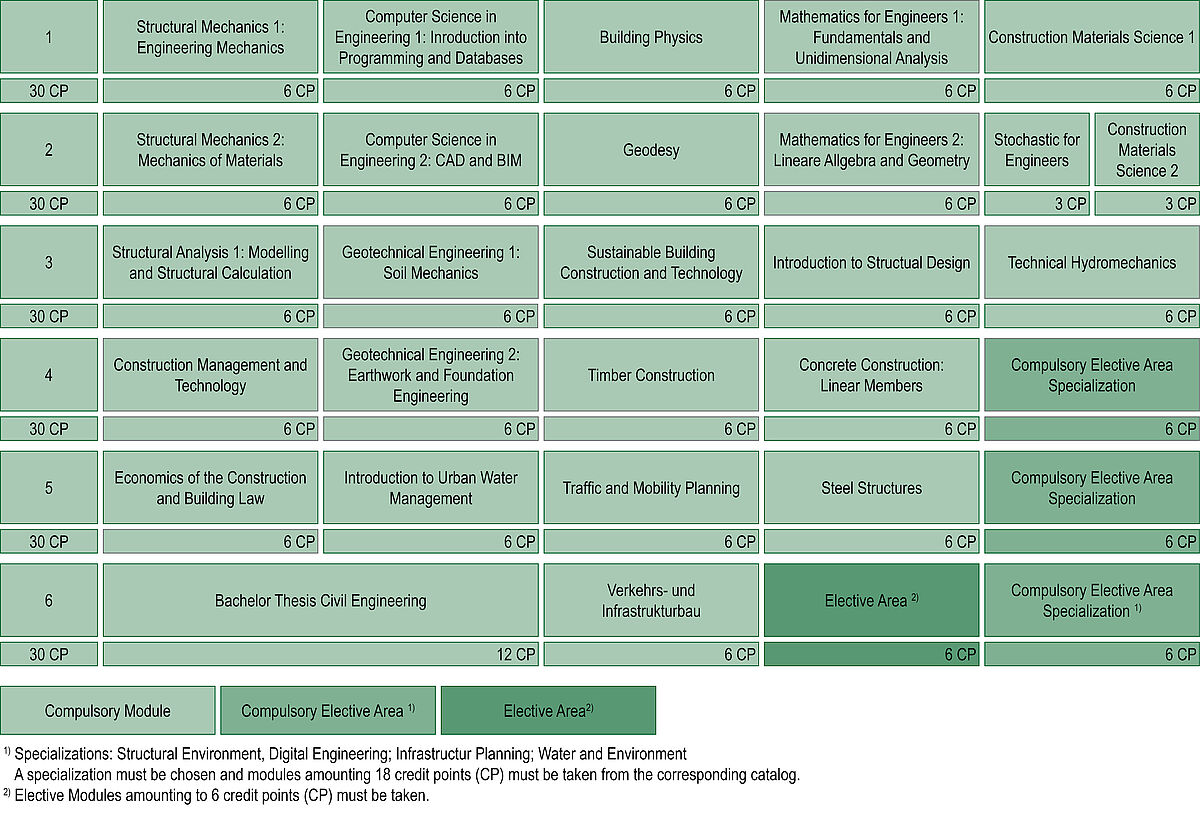Course of Study
- The Bachelor's degree course in Civil Engineering is a modularised attendance programme with a duration of six semesters. The programme is divided into a compulsory, compulsory elective and elective area.
- Students are taught scientific-mathematical and engineering fundamentals in the fields of statics, strength of materials, geotechnics, structural engineering, structural design and hydromechanics. They possess the skills for the graphic design of structures and the professional implementation in CAD drawings and 3D building models. They can describe business and economic contexts and summarise the legal principles of building law. They can describe important processes in the construction process and carry out construction, dimensioning and calculation with common building materials (steel, concrete, wood, masonry, etc.). Graduates have application-ready knowledge for the design and implementation of engineering structures and for applications in urban water management and recycling management. They can establish urban planning connections from the building to the city and build sustainably.
- In the compulsory elective area, students can choose between four specialisations and acquire specific knowledge and methods of civil engineering. Modules totalling 18 credit points must be studied in the chosen specialisation.
- The study programme is supplemented by an elective area, which can be used for further specialisation within the chosen specialisation and for career orientation. Modules totalling six credit points must be completed.
- The degree programme is offered in German and can only be started in the winter semester.
Teaching and learning forms

The study-specific examination and study regulations of the Bachelor's degree programme in Environmental Engineering determine which modules have to be completed in which semester (see study programme schedule). In addition, students receive a timetable for each semester in which the courses of all modules of the respective semester are scheduled.
The contents of the course are taught in different courses. The types of courses are characterised by the use of different forms of teaching and learning.
The following types of courses are used in the Bachelor's programme in Environmental Engineering:
Examinations and Examination Prerequisites

As a rule, each module concludes with an examination at the end of the respective semester.
The examination can take the form of a written exam, an oral examination or another form (e.g. term paper, presentation). It can be taken as an individual or group examination. In addition, examinations (e.g. presentation/presentation) can be taken during lectures.
Preliminary examinations can be specified in a module (see also module description). The examination prerequisites are announced at the beginning of the semester. They can be assessed and graded, but are not included in the module grade. The following preliminary examinations are possible in the degree programme Civil Engineering:
- Exercises
- Paper
- Poster presentation
- Practical examination
- Regular participation in cources according to § 7
- Short presentation
- Test
Examination Period
At the Faculty of Agriculture, Civil and Environmental Engineering the examination period of a semester is divided into two examination phases. The first examination phase of the examination period of a semester takes place in the first three weeks after the end of the lecture period. The second examination phase of the examination period takes place two weeks before the start of the new semester.
Written and oral examinations are offered in at least one of the two examination phases.

